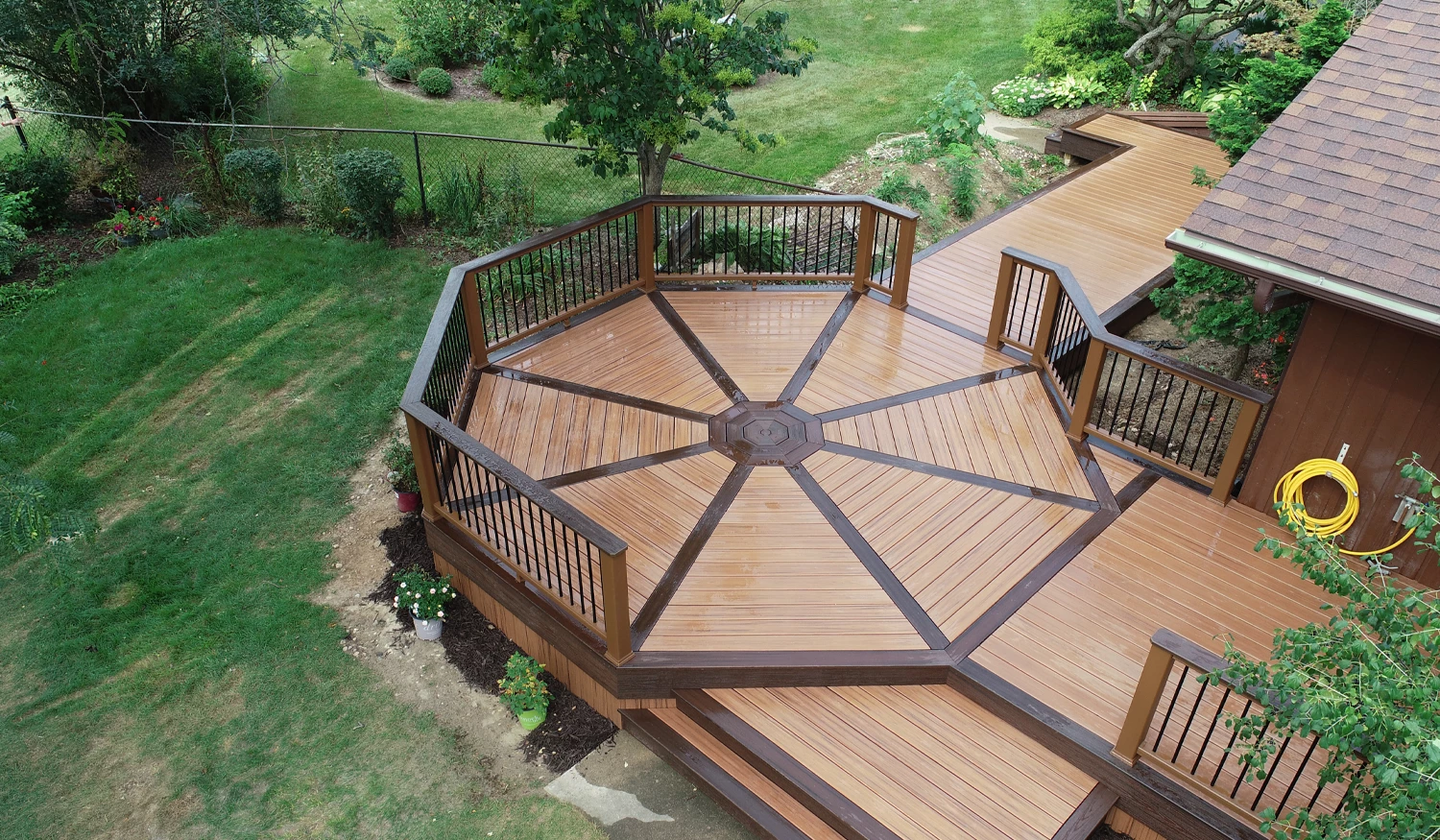Find peace of mind by hiring a certified deck installer Austin who knows the local building codes.
Find peace of mind by hiring a certified deck installer Austin who knows the local building codes.
Blog Article
Just how to Pick the Right Materials for Your Deck Installation Task
Selecting the appropriate products for your deck installment job can seem overwhelming. There are many variables to take into consideration, from sturdiness and maintenance to aesthetic appeals and environmental effect. The choice in between typical timber and composite materials, each with its very own set of advantages and drawbacks, can be especially difficult. The key is to stabilize your spending plan, layout choices, and way of life needs to create a deck that will certainly improve your exterior area for years to come.
Comprehending the Different Kinds Of Deck Products
When beginning on a deck installation project, the option of products ends up being a critical choice. Compound materials, on the various other hand, are a blend of wood and plastic, offering longevity and resistance to weather aspects. By comprehending these differences, home owners can make a more educated decision on the most suitable deck product for their specific requirements.
Assessing the Durability and Upkeep Requirements of Deck Materials
Examining the longevity and maintenance needs of deck products is a crucial action in deck installation. Resilience involves the material's capacity to stand up to rough weather, damage, and its durability. As an example, cedar and redwood are naturally resistant to rot and insects, making them sturdy options. On the various other hand, pressure-treated wood, while sturdy, may need more maintenance due to its susceptibility to breaking and warping.
Comprehending upkeep requirements is similarly crucial. Some materials need regular securing or tarnishing to keep their appearance and resist dampness damages, while others, like composite decking, demand less maintenance. By evaluating these aspects, one can choose one of the most appropriate decking product, ensuring an equilibrium between resilience, maintenance demands, and visual charm.
Cost Evaluation: Contrasting Wood and Composite Decking
Although expense might at first seem like an additional worry, it is a substantial factor when comparing timber and composite outdoor decking. Timber, generally a less expensive alternative, has a lower ahead of time cost. Over time, maintenance costs can build up, potentially making timber a lot more expensive in the lengthy run. These upkeep costs may consist of staining, securing, or replacing harmed boards. On the other hand, composite outdoor decking, while costlier initially, needs much less maintenance, possibly lowering long-lasting costs. Yet, it's important to bear in mind that composite outdoor decking isn't unsusceptible deterioration, and replacement expenses can be high. Potential deck proprietors need to consider their spending plan and desire to keep their decks when deciding in between timber and composite decking.
Looks and Layout Versatility of Decking Products
While expense is a vital factor to consider, the aesthetic appeal and design versatility of decking materials also play a significant duty in the decision-making procedure. Different products use varying degrees of visual charm. Natural timber decking supplies a timeless, timeless look, while composite products offer a vast array of shades and textures to fit diverse tastes and designs. Style adaptability refers to the capability to form and control the outdoor decking product to meet particular layout requirements. Timber, for example, uses high layout versatility because of its ease of cutting and shaping. Composite materials, while much less versatile in layout, are still versatile sufficient for the majority of deck styles. These aspects, therefore, are essential determinants in the option of outdoor decking product.
Ecological Influence of Decking Products
When picking outdoor decking products, one must useful source think about not just looks and toughness, however additionally the environmental impact. It's essential to examine the sustainability of materials and check out recycled outdoor decking here are the findings alternatives. Understanding the potential influence on neighborhood ecosystems will certainly make certain a more eco responsible option.
Evaluating Material Sustainability
In the realm of deck building, examining product sustainability is a critical action. This entails reviewing the environmental effect of each possible product, taking into consideration aspects such as the energy required for its production, its carbon impact, and its end-of-life disposal or recycling options. For example, wood is a renewable energy, however unsustainable logging practices can cause deforestation. Conversely, composite decking materials typically integrate wood and plastic, reducing the demand for brand-new hardwood however boosting dependence on nonrenewable fuel sources. Light weight aluminum and various other metals might be more sturdy and recyclable, however their extraction and handling can be energy-intensive. Thus, the option of decking products need to balance capability, appearances, expense, and sustainability to guarantee a responsible and long-lasting installation.
Recycled Outdoor Decking Choices

Composite decking is particularly popular due to its resilience and simplicity of maintenance. Recycled plastic decking, on the other hand, is highly resilient and requires very little maintenance.

Influence On Local Ecosystems
While the advantages of utilizing recycled products for decking can not be overstated, it's just as essential to take into consideration the wider ecological ramifications of these selections. The removal, processing, and transportation of products can profoundly affect neighborhood environments. Logging for timber decking adds to habitat loss and environment change. Even the production of composite products can launch harmful discharges. Conversely, utilizing recycled or sustainably sourced products can aid mitigate these effects. Moreover, taking into consideration the lifespan of products can lower ecological impact; longer-lasting options require less frequent substitute, thus conserving resources. Appropriate disposal of old outdoor decking is crucial to reducing landfill waste. Essentially, an eco-conscious deck project demands mindful material selection, lasting sourcing, and liable disposal.
Making Your Decision: Tips for Choosing the most effective Deck Products
As the short article transitions right into the subtopic of "Making Your Decision: Tips for Choosing the most effective Deck Products", it is essential to recognize the range of deck materials readily available. Striking a balance in between toughness and aesthetics is essential in this option process. The adhering to discussion will certainly direct readers in making an educated choice based upon these key factors to consider.
Understanding Various Deck Products
The task of selecting the ideal materials for your deck installment can seem daunting due to the vast array of alternatives readily available. Plastic or PVC decks are also a lot more long lasting and need less maintenance than composite products, yet they can look much less all-natural. Light weight aluminum decks are solid, light-weight, and resistant to rot, but they are also the most expensive option.
Toughness vs. Visual Appeals Equilibrium
Stabilizing toughness with looks can be a difficulty when picking deck products. The decision frequently boils down to individual preferences and the deck's planned use. High-traffic areas may demand resilient products like composite decking, which stands up to damage yet might do not have the natural appeal of wood. On the various other hand, wood supplies an ageless appeal and warmth that synthetic products battle to duplicate. Nevertheless, it requires extra upkeep and may not last as long. Home owners require to strike a balance, taking into consideration both the deck's practical needs and their visual preferences. By doing so, they can ensure their deck remains a practical and eye-catching outside space for several years ahead.
Conclusion
To conclude, selecting the best materials for your deck installment job requires mindful consideration of variables such as resilience, maintenance, expense, aesthetics, and ecological impact. Whether you choose typical wood or composite materials, your selection should line up with your budget, design preferences, and lifestyle. Inevitably, the most effective decking product is one that improves your outdoor room and provides satisfaction for years to come.
Report this page